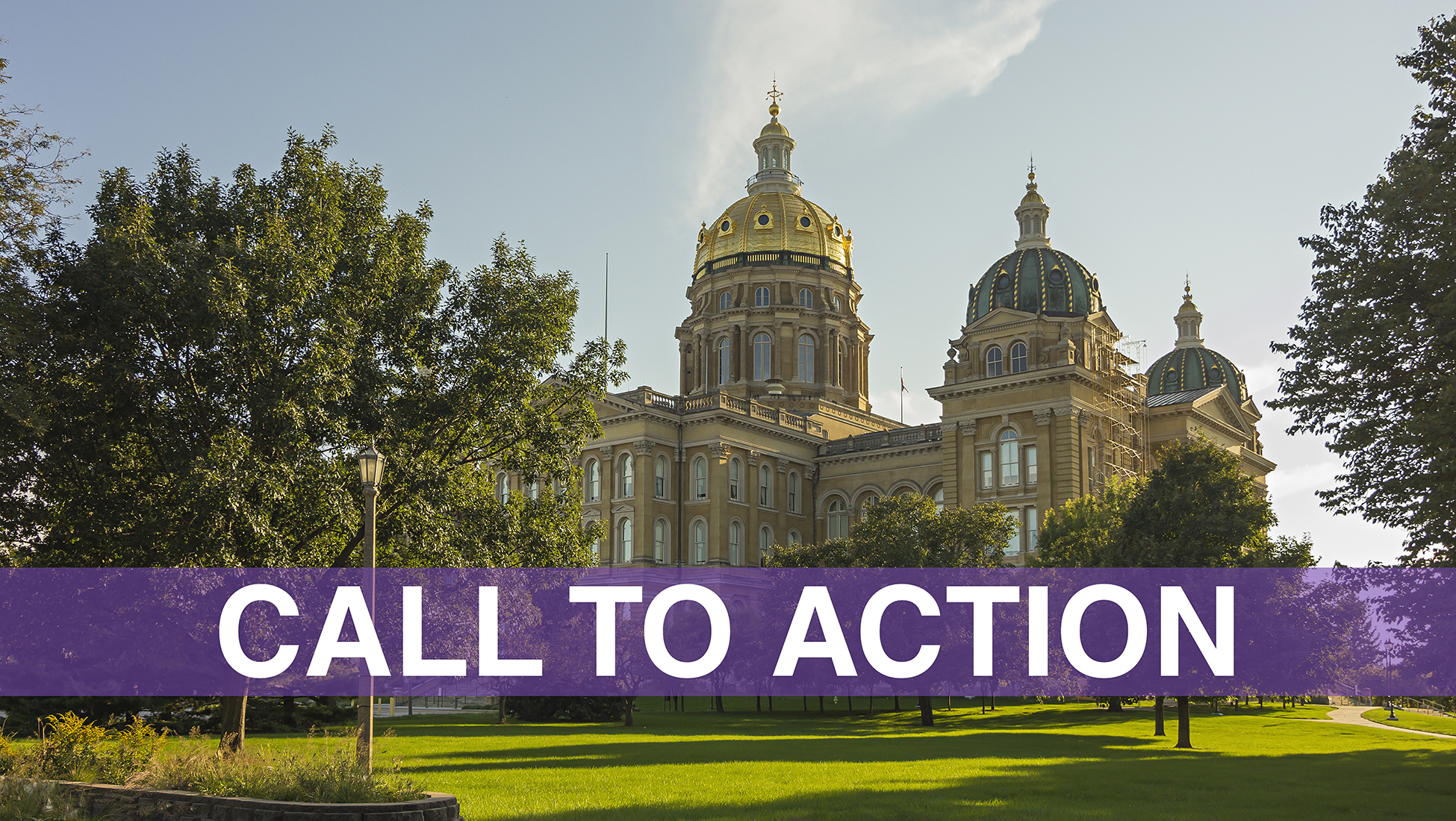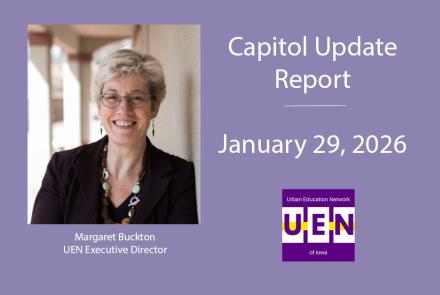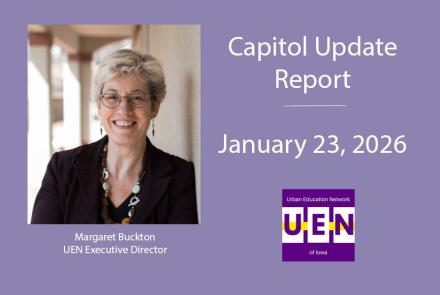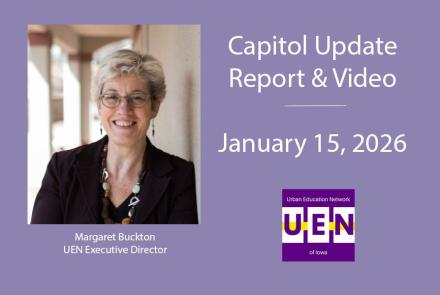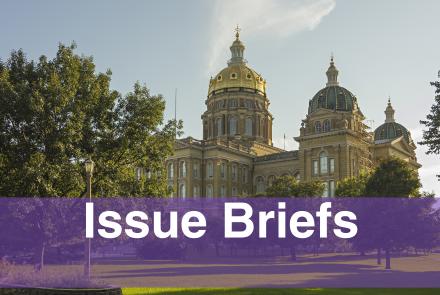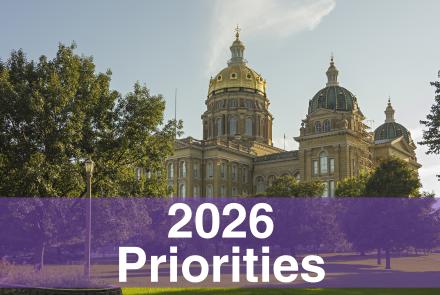Call to Action - Governor's School Choice Omnibus Bill (Vouchers) - 01/31/2022
CALL TO ACTION
Education Savings Accounts (Vouchers) Are Not for Iowa
January 31, 2022
Download the full UEN Call to Action on Vouchers
Word to the wise: Several big policies, including school funding and tax relief, are on the agenda for the statehouse this week. They are all related. UEN is encouraging the legislature to take a balanced approach, position public schools for success, and consider measured tax relief that does not dampen the State’s future ability to adequately fund schools. We encourage our members to engage in thoughtful discussion and advocacy, respecting our state leaders who are wrestling with these big issues and encouraging advocates to build positive relationships going forward. The first big policy bill is the Governor’s Omnibus School Choice and Parents’ Rights bill.
School Choice Discussions begin in the Senate – The Governor’s Parent Choice Bill, SSB 3080, has been introduced and assigned a subcommittee.
There is a subcommittee meeting scheduled for Wed., Feb 2, at 4:00. Comments may be submitted in writing prior to the subcommittee meeting via this link: https://www.legis.iowa.gov/committees/meetingPublicComment?meetingID=34605&action=viewCommitteePublicComments
You can watch the meeting via zoom at this link: https://us06web.zoom.us/j/81984272026?pwd=TzErRXBOR2FrSzN1ZWRaMU5henp5QT09
Bill Provisions and UEN Rationale and Position:
SSB 3080 Governor’s School Choice and Parent Transparency: this bill has many provisions that UEN opposes that are over bearing and difficult to administer at the school level, others not for Iowa and some provisions that we would likely work to improve if introduced in separate bills. Senators Sinclair, Rozenboom and Celsi are assigned to the subcommittee. Details of the bill:
Division I Transparency and State Standards and Removing Library Books: This part of the bill requires public schools to post a course syllabus or written summary of materials to be taught in each class in the school district, sortable by subject area, grade level and teacher. The district is also required to post how each class in the district meets or exceed Iowa Code 256.11 education standards, sortable by subject area, grade level, and teacher. (The “sortable” requirement will likely mean a cost to develop and maintain software for school districts. Titles of all educational materials for each class, procedures and policies to select materials at all levels of the school, list of all library books, too. DE is required to develop a flowchart of procedures and policies to request removal of a book from the library and districts must post it. This division also requires the annual audit to determine compliance with this section and requires the DE to withhold state foundation aid for every day the district is not in compliance. The bill also identifies timelines for district review of a parent request and allows the parent to appeal the district determination to the school board, and then to the State BOE. UEN Rationale: this is an unfunded mandate and overly prescriptive. School boards already have policies regarding parent requests to remove books or review curriculum materials. The appeal to the state board does not specify the grounds by which the state board would overturn a local decision. UEN opposes this division.
Division II Education Savings Accounts (Vouchers): this part of the bill allows students attending an accredited nonpublic school (defined in IC 285.16) as eligible, including: 1) household income below 400% of FPL (up to 5,000 scholarships), 2) student with an IEP (up to 5,000 scholarships), 3) students who received one in the prior year. If not all 5,000 slots are claimed in either category, additional scholarships may be given in the other. Application must include proof of enrollment into the private school.
Parents apply by Jan. 1, DE notifies parents by Feb.1. The scholarship amount is equal to the weighted enrollment the student would generate if enrolled in the public school without the property tax component (average state aid in the state). The funds can be used by the parents or student for tuition and other specifically mentioned expenses. Unlike last year’s policy, any balance of funds at HS graduation goes back to the state coffers (parents can NOT use funds for college after HS graduation.) If a student is expelled from the private school, the parent must pay the funds back. If the student withdraws due to change of residence and does not re-enroll in a private school, any prorated funds must be paid back. The bill specifically states that private schools do not have to change their enrollment or educational standards as a result of receiving funds from an ESA (example of uneven playing field as public schools take all students). Has an expedited timeline for fall of 2022, with parents applying by May 1 and DE notifying parents by June 1. UEN Rationale: Although we don’t know how many students will leave public school to take advantage of this voucher program, we assume most income-eligible kindergarten students will apply. Although this starts small, it will build as vouchers have in other states, until its price tag is likely more than half a billion. Additionally, loss of public-school students without notice until June 1 would impact staffing and budget decisions after those had already been determined for public schools. See talking points below on what vouchers are not for Iowa. UEN opposes this provision.
School Enrollment Supplement: this part of the bill appropriates the equivalent of about 30% of the SCPP multiplied by the number of voucher recipients beginning in FY 2024 into a fund for school districts with a budget enrollment of 500 or less. UEN Rationale: The Governor’s budget documents explained that small changes in enrollment can be very hard on small districts. Although we would agree that enrollment decline is hard to manage, districts of all sizes experience significant enrollment decline. If this is a priority of the Governor, we would prefer that the School Finance Interim Committee consider funding formulas in other states and the needs of Iowa students and address those inequities rather than creating another one. UEN opposes this provision.
Division III Social Studies Instruction: this part of the bill requires high school students to pass the immigration and naturalization services test for citizenship with a score of 705 of the questions answered correctly in order to graduate. Students are allowed to take the test multiple times. Districts and private schools are allowed to adjust the test to meet a student’s IEP. UEN Rationale: Many high schools use the questions of this test in their instructional materials. However, requiring this mandate will result in some students not graduating, perhaps carrying over to the next school year in order to complete the requirement. The test may be unmanageable for students for whom English is not their primary language, many of whom are educated in urban schools. UEN believes in local control, that it is the role of the school board and community to determine how performance for graduation is assessed. UEN opposes this provision.
Division IV Private Instruction – Special Education: this part of the bill eliminates the requirement that the AEA director approve a child with an IEP to receive competent private instruction (home school), allows a parent of a child with an IEP to request dual enrollment, and requires services to be determined and provided based on Iowa Code 256B and administrative rules. UEN Rationale: we have questions about the workability of this provision. It is unknown if the student would come to the public school to receive the services required in their IEP or if school employees would have to deliver those services at the student’s home. If it’s the latter, we will be opposed to this section. That would be an expensive use of school district staff time that is already scarce with a shortage of special education teachers and paras. Any additional costs would be shifted to special education deficits which are paid with property taxes. UEN is currently undecided on this provision until we find out more.
Division V Open Enrollment: this part of the bill allows the denial of an open enrollment request by either the sending or receiving district for a sibling or stepsibling of a student who open enrolls for good cause due to repeated acts of harassment of the student that the district cannot adequately address, the consistent failure of the school district meet the basic academic standards or serious health condition to also be appealed to the state BOE under section 290.1. It also allows that sibling to participate in varsity athletics without a waiting period (282.18 subsection 11). And Division VI Teacher Librarians: this part of the bill specifies that a teacher librarian license shall not require a master’s degree. UEN is undecided on these two provisions.
Talking Points: Oppose Vouchers
- Public money should be for public schools. Period. The public’s investment should be used to support public community schools which are open to all students regardless of race, religion, gender, socio-economic status and disability, not for a new entitlement program for parents who choose private education.
- Public funds require public accountability and transparency. Public schools are overseen by a publicly elected citizen governing board, are required to report academic results to the general public, have an annual public financial audit, and be transparent with all expenditures and decision-making. Private and religious schools are not held to that same public standard. Taxpayers have a right to know how their funds are being used, but are left in the dark about the use and impact of voucher funds.
- This bill is a slippery slope toward a costly and expansive voucher program: This voucher program may start small, but as we've seen in other states, once a program is established, it is easy to expand. This will pull more resources away from public schools.
- Uneven playing field: Private schools do not have to accept all students, do not participate in state testing or reporting, do not have to follow all of the same rules and regulations are public schools.
- Iowa has significant parent choice: Open enrollment within district, virtual program within district, open enrollment to another public-school district, good nonpublic schools (with significant tuition assistance for low-income families provided by school tuition organizations and expanded tuition and textbook tax credits last session), competent private instruction (home school with support) or independent private instruction (home school without support). New charter school legislation and expansion of open enrollment good cause exemptions from last year haven’t been given a chance to be implemented yet. The additional benefit of one more choice for a few parents has larger negative consequences for students who remain in the school, for taxpayers and for the rest of the community.
Senate Education Committee Members: Next stop after the subcommittee meeting
The following links will take you to each committee member’s legislative page, with email address and often home or cell phone number so you can easily connect with them. Remember to be respectful and explain the impact these bills would have on your school and education for your students. Also be sensitive to using school email when contacting legislators who may prefer you use your personal email rather than school property for advocacy purposes.
Senate Education Committee Members
|
Contact Information:
The following links will help you find contact information such as email address and often home or cell phone numbers, so you can easily connect with your legislators.
Find your Senator’s contact information here: https://www.legis.iowa.gov/legislators/senate
Find your Representative’s contact information here: https://www.legis.iowa.gov/legislators/house
If you don’t know who your Legislators are, find out by selecting your school district, through the interactive map, or by entering an address here: https://www.legis.iowa.gov/legislators/find
To call and leave a message at the Statehouse, the Senate switchboard operator number is 515.281.3371 and the House switchboard operator number is 515.281-3221. You can ask if they are available, leave a message for them to call you back, or just leave a short message such as “Oppose Governor’s School Choice Omnibus Bill, SSB 3080.” (Legislators are typically back home over the weekend).


